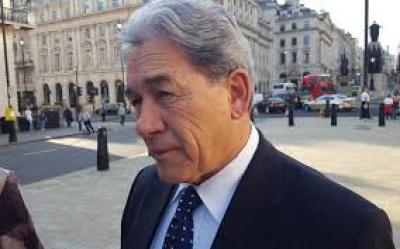Deputy Prime Minister foresaw perils of trade fixation on East
AN extraordinary and unforeseen series of global trade crises means that New Zealand foreign minister Winston Peters can return the agrarian products exporter to its original bulk market which is Great Britain.
Chief among these crises are:-
- The United States – China trade war the armistice of which ends this week
- Brexit due at the end of March which hard or soft sees New Zealand as a central beneficiary
- President Trump’s turning his back on collective free trade agreements such as the EU
- The failure in its objectives of the Trans Pacific version of the free trade agreement boycotted by the United States
Mr Peters recalibrating New Zealand trade back toward the United Kingdom has been conducted in stealth.
This is because the New Zealand parliamentary Labour government has tilted determinedly toward Asia.
In addition there is the ideological wing of the governing coalition which views Britain as the embodiment of colonialism, and therefore of the evils it believes it bestowed.
Still another factor propelling New Zealand to the Occident is the stalled trade agreement with the Gulf States of the Middle East.
It now lies in a collection of ISO containers in dockside Napier, where it will stay.
The six containers hold the kitset factory promised to Saudi Arabia interests as the final tranche in compensation and appeasement for the start-go-stop policy on live shipments by successive Labour and National governments.
Yet no single event has provided quite the intensity of focus on the re-creation of the imperial preference trade epoch as the emerging perils of the long term strategic trade expectation with China.
When Mr Peters prior to the advent of the coalition government, of which he is also deputy prime minister, toured Britain’s House of Lords several years ago positing the possibility of a return to the preference era the gesture was regarded in New Zealand as quaint rather than purposeful, an exercise in music hall nostalgia rather than mercantilism.
President Trump’s ascendancy caught by complete surprise Commonwealth governments as well as the EU’s, and turned it into something deadly serious.
It now became in practice possible in fact for Britain to implement its referendum and quit the EU simply because there is no United States pressure to stay in it.
Few still recall President Obama’s only partially veiled threat to the UK that outside the EU it would find itself relegated to the “back of the queue.”
At first president President Trump’s raucous invocations about the China – US trade imbalance seemed to governments such as New Zealand’s a higher octane version of the usual rhetoric about China’s ability to filch innovations then implement them in volume standardisation and production scale and then send them back to the West in general and the United States in particular.
All this changed with the detention in Canada of Huawei heir Meng Wanzhou.
North America had awoken to the chilling realisation that Chinese manufacturers were overwhelming their combined high end industry which is telecommunications.
This is painfully so in its process applications such as the one in the underpinning technology in the pending era of driver-less vehicular transport and thus the next step to the new industrial age.
It was now that the Chinese-United States chill made the transition from an ideological contest involving consumer durables and commodities into the industrial survival freeze-over it has just become.
It is in this standoff with its potential collateral damage to United States allies that the UK emerges as the alternate bulk buyer which gives New Zealand the diversification to adjust to and counterbalance its China weighting.
Avant garde panics such as the food miles one, a modish reprise on the old “tyranny of distance” mantra, have evaporated.
Data has demonstrated that the main cost and main contributor to carbon dioxide emissions are those involved with getting the produce on and off the ship and thus remain constant regardless of the distance travelled by the cargo vessel.
In the end it was the belated discovery of the true extent of the inroads by the Chinese into its telecommunications sector (Nortel, a faint memory, and can anyone still remember Research in Motion the Blackberry supplier to Western parliaments and also to Capitol Hill?) that prompted Canada’s government to toss aside its vaunted identity niceties and grab a high flying glass ceiling cracking ethnic Vancouver housewife known to her neighbours as Sabrina.
In just a matter of weeks, days almost, Winston Peters’ long held doubts about the durability and reliability of the Chinese market were starkly visible.
His hedge into the old UK market was there as an exhibition of trade common sense, insurance even.
He shunted his coalition colleagues and the orientalists in the bureaucracy who in common with Kipling’s soldier savoured the mysteries of the East to the exclusion of anything beyond it, toward a comprehension of the scope of the UK re-opening for business again.
Mr Peters always knew that the United States – China trade picture at some stage was going to turn even nastier and that the secondary participants such as New Zealand however they sought to play the two sides were going to get scorched.
He has always viewed his role as more than that of a retail politician cuddling up to voters with things like travel discounts for the ageing.
Now, at this very late stage in his long career a flurry of unforeseeable shifts across the globe throws open the door to his long incubated appointment with destiny.
Brexit, Mr Peters, then in opposition, told his British audience in February 2016 represented “an excellent opportunity to heal a rift dating back to 1973.”
This was a scant five years before Mr Peters entered Parliament.
He knows as do the Eastern mystics that what goes around, comes around.

